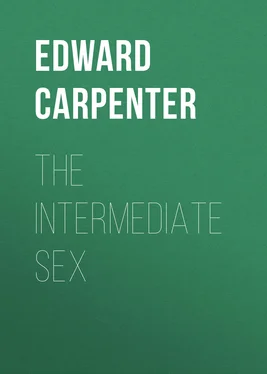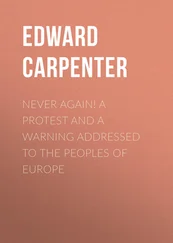Edward Carpenter - The Intermediate Sex
Здесь есть возможность читать онлайн «Edward Carpenter - The Intermediate Sex» — ознакомительный отрывок электронной книги совершенно бесплатно, а после прочтения отрывка купить полную версию. В некоторых случаях можно слушать аудио, скачать через торрент в формате fb2 и присутствует краткое содержание. Жанр: psy_sex_and_family, foreign_edu, foreign_desc, на английском языке. Описание произведения, (предисловие) а так же отзывы посетителей доступны на портале библиотеки ЛибКат.
- Название:The Intermediate Sex
- Автор:
- Жанр:
- Год:неизвестен
- ISBN:нет данных
- Рейтинг книги:4 / 5. Голосов: 1
-
Избранное:Добавить в избранное
- Отзывы:
-
Ваша оценка:
- 80
- 1
- 2
- 3
- 4
- 5
The Intermediate Sex: краткое содержание, описание и аннотация
Предлагаем к чтению аннотацию, описание, краткое содержание или предисловие (зависит от того, что написал сам автор книги «The Intermediate Sex»). Если вы не нашли необходимую информацию о книге — напишите в комментариях, мы постараемся отыскать её.
The Intermediate Sex — читать онлайн ознакомительный отрывок
Ниже представлен текст книги, разбитый по страницам. Система сохранения места последней прочитанной страницы, позволяет с удобством читать онлайн бесплатно книгу «The Intermediate Sex», без необходимости каждый раз заново искать на чём Вы остановились. Поставьте закладку, и сможете в любой момент перейти на страницу, на которой закончили чтение.
Интервал:
Закладка:
It appears that the loves of such women are often very intense, and (as also in the case of male Urnings) life-long. 9Both classes feel themselves blessed when they love happily. Nevertheless, to many of them it is a painful fact that—in consequence of their peculiar temperament—they are, though fond of children, not in the position to found a family.
We have so far limited ourselves to some very general characteristics of the Intermediate race. It may help to clear and fix our ideas if we now describe more in detail, first, what may be called the extreme and exaggerated types of the race, and then the more normal and perfect types. By doing so we shall get a more definite and concrete view of our subject.
In the first place, then, the extreme specimens—as in most cases of extremes—are not particularly attractive, sometimes quite the reverse. In the male of this kind we have a distinctly effeminate type, sentimental, lackadaisical, mincing in gait and manners, something of a chatterbox, skilful at the needle and in woman’s work, sometimes taking pleasure in dressing in woman’s clothes; his figure not unfrequently betraying a tendency towards the feminine, large at the hips, supple, not muscular, the face wanting in hair, the voice inclining to be high-pitched, etc.; while his dwelling-room is orderly in the extreme, even natty, and choice of decoration and perfume. His affection, too, is often feminine in character, clinging, dependent and jealous, as of one desiring to be loved almost more than to love. 10
On the other hand, as the extreme type of the homogenic female, we have a rather markedly aggressive person, of strong passions, masculine manners and movements, practical in the conduct of life, sensuous rather than sentimental in love, often untidy, and outré in attire; 11her figure muscular, her voice rather low in pitch; her dwelling-room decorated with sporting-scenes, pistols, etc., and not without a suspicion of the fragrant weed in the atmosphere; while her love (generally to rather soft and feminine specimens of her own sex) is often a sort of furor, similar to the ordinary masculine love, and at times almost uncontrollable.
These are types which, on account of their salience, everyone will recognise more or less. Naturally, when they occur they excite a good deal of attention, and it is not an uncommon impression that most persons of the homogenic nature belong to either one or other of these classes. But in reality, of course, these extreme developments are rare, and for the most part the temperament in question is embodied in men and women of quite normal and unsensational exterior. Speaking of this subject and the connection between effeminateness and the homogenic nature in men, Dr. Moll says: “It is, however, as well to point out at the outset that effeminacy does not by any means show itself in all Urnings. Though one may find this or that indication in a great number of cases, yet it cannot be denied that a very large percentage, perhaps by far the majority of them, do not exhibit pronounced Effeminacy.” And it may be supposed that we may draw the same conclusion with regard to women of this class—namely, that the majority of them do not exhibit pronounced masculine habits. In fact, while these extreme cases are of the greatest value from a scientific point of view as marking tendencies and limits of development in certain directions, it would be a serious mistake to look upon them as representative cases of the whole phases of human evolution concerned.
If now we come to what may be called the more normal type of the Uranian man, we find a man who, while possessing thoroughly masculine powers of mind and body, combines with them the tenderer and more emotional soul-nature of the woman—and sometimes to a remarkable degree. Such men, as said, are often muscular and well-built, and not distinguishable in exterior structure and the carriage of body from others of their own sex; but emotionally they are extremely complex, tender, sensitive, pitiful and loving, “full of storm and stress, of ferment and fluctuation” of the heart; the logical faculty may or may not, in their case, be well-developed, but intuition is always strong; like women they read characters at a glance, and know, without knowing how, what is passing in the minds of others; for nursing and waiting on the needs of others they have often a peculiar gift; at the bottom lies the artist-nature, with the artist’s sensibility and perception. Such an one is often a dreamer, of brooding, reserved habits, often a musician, or a man of culture, courted in society, which nevertheless does not understand him—though sometimes a child of the people, without any culture, but almost always with a peculiar inborn refinement. De Joux, who speaks on the whole favourably of Uranian men and women, says of the former: “They are enthusiastic for poetry and music, are often eminently skilful in the fine arts, and are overcome with emotion and sympathy at the least sad occurrence. Their sensitiveness, their endless tenderness for children, their love of flowers, their great pity for beggars and crippled folk are truly womanly.” And in another passage he indicates the artist-nature, when he says: “The nerve-system of many an Urning is the finest and the most complicated musical instrument in the service of the interior personality that can be imagined.”
It would seem probable that the attachment of such an one is of a tender and profound character; indeed, it is possible that in this class of men we have the love sentiment in one of its most perfect forms—a form in which from the necessities of the situation the sensuous element, though present, is exquisitely subordinated to the spiritual. Says one writer on this subject, a Swiss, “Happy indeed is that man who has won a real Urning for his friend—he walks on roses, without ever having to fear the thorns”; and he adds, “Can there ever be a more perfect sick-nurse than an Urning?” And though these are ex parte utterances, we may believe that there is an appreciable grain of truth in them. Another writer, quoted by De Joux, speaks to somewhat the same effect, and may perhaps be received in a similar spirit. “We form,” he says, “a peculiar aristocracy of modest spirits, of good and refined habit, and in many masculine circles are the representatives of the higher mental and artistic element. In us dreamers and enthusiasts lies the continual counterpoise to the sheer masculine portion of society—inclining, as it always does, to mere restless greed of gain and material sensual pleasures.”
That men of this kind despise women, though a not uncommon belief, is one which hardly appears to be justified. Indeed, though naturally not inclined to “fall in love” in this direction, such men are by their nature drawn rather near to women, and it would seem that they often feel a singular appreciation and understanding of the emotional needs and destinies of the other sex, leading in many cases to a genuine though what is called ‘Platonic’ friendship. There is little doubt that they are often instinctively sought after by women, who, without suspecting the real cause, are conscious of a sympathetic chord in the homogenic which they miss in the normal man. To quote De Joux once more: “It would be a mistake to suppose that all Urnings must be woman-haters. Quite the contrary. They are not seldom the faithfulest friends, the truest allies, and most convinced defenders of women.”
To come now to the more normal and perfect specimens of the homogenic woman , we find a type in which the body is thoroughly feminine and gracious, with the rondure and fulness of the female form, and the continence and aptness of its movements, but in which the inner nature is to a great extent masculine; a temperament active, brave, originative, somewhat decisive, not too emotional; fond of out-door life, of games and sports, of science, politics, or even business; good at organisation, and well-pleased with positions of responsibility, sometimes indeed making an excellent and generous leader. Such a woman, it is easily seen, from her special combination of qualities, is often fitted for remarkable work, in professional life, or as manageress of institutions, or even as ruler of a country. Her love goes out to younger and more feminine natures than her own; it is a powerful passion, almost of heroic type, and capable of inspiring to great deeds; and when held duly in leash may sometimes become an invaluable force in the teaching and training of girlhood, or in the creation of a school of thought or action among women. Many a Santa Clara, or abbess-founder of religious houses, has probably been a woman of this type; and in all times such women—not being bound to men by the ordinary ties—have been able to work the more freely for the interests of their sex, a cause to which their own temperament impels them to devote themselves con amore .
Читать дальшеИнтервал:
Закладка:
Похожие книги на «The Intermediate Sex»
Представляем Вашему вниманию похожие книги на «The Intermediate Sex» списком для выбора. Мы отобрали схожую по названию и смыслу литературу в надежде предоставить читателям больше вариантов отыскать новые, интересные, ещё непрочитанные произведения.
Обсуждение, отзывы о книге «The Intermediate Sex» и просто собственные мнения читателей. Оставьте ваши комментарии, напишите, что Вы думаете о произведении, его смысле или главных героях. Укажите что конкретно понравилось, а что нет, и почему Вы так считаете.












